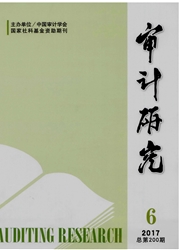

 中文摘要:
中文摘要:
财政部于2011年底发布了《行政事业单位内部控制规范》(征求意见稿),对行政事业单位的内控研究提出了迫切的要求。我国事业单位的内部控制建设是一个崭新的课题,国际上缺乏既有的可完全效仿的借鉴,这就要求我们在实践中不断总结经验,探索符合我国事业单位实际情况的内部控制体系。本文通过某事业单位财务人员进行事业单位内部控制现状的问卷调查,分析总结了事业单位内部控制的目标、风险点、影响因素和改进措施等。调查结果表明,事业性业务收入、工程项目、“小金库”是目前事业单位面临的主要风险;为提高事业单位风险管理水平,应采取加快推进事业单位体制改革、实行重大事项集体决策、推进信息公开化、引入外部审计监督等措施。
 英文摘要:
英文摘要:
At the end of 2011, the Ministry of Finance released Internal control standard for administrativeinstitutions, which proposed urgent requirement for studies on institutions internal control. Internal control for China's institutions is a new study issue, and there is no existing international experience that we can fully copy, which requires us to constantly summarize experience in practice and thus explore the internal control system in line with the actual situation of China's institutions. Through questionnaire on the financial officer, this study summarizes and analyzes the control objective, risk points, impact factors and improvement measures of internal control in Chinese public institutions. The survey results show that income from institutional fees, engineering projects and "little coffers" are the main risks faced by the current institutions. To improve the level of risk management of institutions, government should accelerate the structural reform of institutions, implement the collective decision-making on major issues, promote information openness and introduce the external audit supervision measures.
 同期刊论文项目
同期刊论文项目
 同项目期刊论文
同项目期刊论文
 期刊信息
期刊信息
